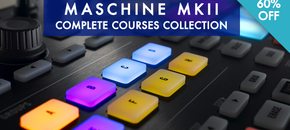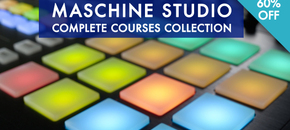- sale
- top rated
From parties in Detroit, to 90s underground raves, all the way to Berlin's buzzing club scene today, Techno has been long-established as one of the world's biggest and most recognisable genres of electronic music. In this course from Producertech Senior Tutor and Berlin resident Rob Jones, comes a detailed insight into the production techniques behind this legendary style.
Leaving no stone unturned, this lengthy course will take you through the basic elements of the track - kick, bass, low/high percussion and a detailed look at creating melodic parts, before covering effects processing and arrangement - with a focus on utilising the Maschine hardware throughout, demonstrating not only the colossal sound design power available, but also workflow techniques and utilising Maschine as a plug-in in other DAWs.
Available immediately after purchase, 24/7/365 anywhere with an internet connection, the course comes complete with 100MB of Techno Samples, courtesy of Loopmasters, and the projects from the course. Help and information is always available on the Producertech forum, where you can post your work for review and discuss techniques and ideas with fellow students and tutors.
MODULE EXCERPT - ADDING HIGH-FREQUENCY PERCUSSION:
<iframe allowfullscreen="" frameborder="0" height="315" src="//www.youtube.com/embed/e-rAjGmqs7M?showinfo=0&autohide=1&iv_load_policy=3&rel=0" width="560"></iframe></p>
Module Details
Creating the Kick
This module goes through the process of creating a multi-layered kick group, complete with macro controls for customising the bottom and top ends, kick attack and body, as well as the kick duration, so a pounding 4 to the floor beat can be laid down.
Low Frequency Percussion
In this lesson, the main rhythmic bass part is created using percussion samples, so the distinctive, rumbling low frequency march can be added to the kick. Several groups are layered together and a sidechain compressor used to control dynamics.
Sub Bass and Bass Processing
This last main lesson on the low frequency elements of the track focuses initially on sub bass, adding some very bottom end, to establish a tonal centre and fatten up the sound. All bass groups are then processed together to gel and solidify the mix.
High Frequency Percussion Part I
The first high frequency percussion lesson starts to add some of the classic and syncopated parts, including hats, cabasas, clicks and other miscellaneous samples, to accompany the bass parts and create the main groove of the track.
High Frequency Percussion Part 2
In the second high frequency percussion module, the parts are processed with send effects, and samples are mixed and layered to improve the sound. Then, a new main rhythmic element is added, complete with various effects for automating throughout the arrangement.
Melodic Sounds
This tutorial covers a large number of techniques to consider when creating melodies, showing a few different ways for playing phrases, either using MaschineÍs built in chord and arpeggiator facility, or playing events in live. The new lead is processed with insert and send effects, including resochord, which is used to create new harmonic texture for developing in breakdowns.
Additional Textures
After discussing the different considerations for how the melodic parts in the track can develop throughout the arrangement, some new sounds are created, including a new vocal part, which is constructed using different slices of a larger sample, which are then processed with different inserts to create a cool tape delay effect.
Arrangement
With all the main components now created, the arrangement is started, first building a collection of different scenes, which are named and coloured accordingly, then using that palette to put the main building blocks of the track in place.
Final Arrangement and Mixing
After the basic arrangement is carried out in Maschine, the software is opened as a plug-in in a DAW, in this case Ableton Live, to finish off the arranging and mixing. There is an explanation of how automation is carried out, as well as how to route sounds in and out of Maschine, then various parts of the arrangement and mixdown are shown and discussed.
Any references to any brands on this site/page, including reference to brands and instruments, are provided for description purposes only. For example references to instrument brands are provided to describe the sound of the instrument and/or the instrument used in the sample. Plugin Boutique do not have (nor do they claim) any association with or endorsement by these brands. Any goodwill attached to those brands rest with the brand owner. Plugin Boutique or its Suppliers do not accept any liability in relation to the content of the product or the accuracy of the description. "RHODES" is a registered trademark of Joseph A Brandstetter.
Also available in these bundles
- sale
- bundle
- sale
- bundle

